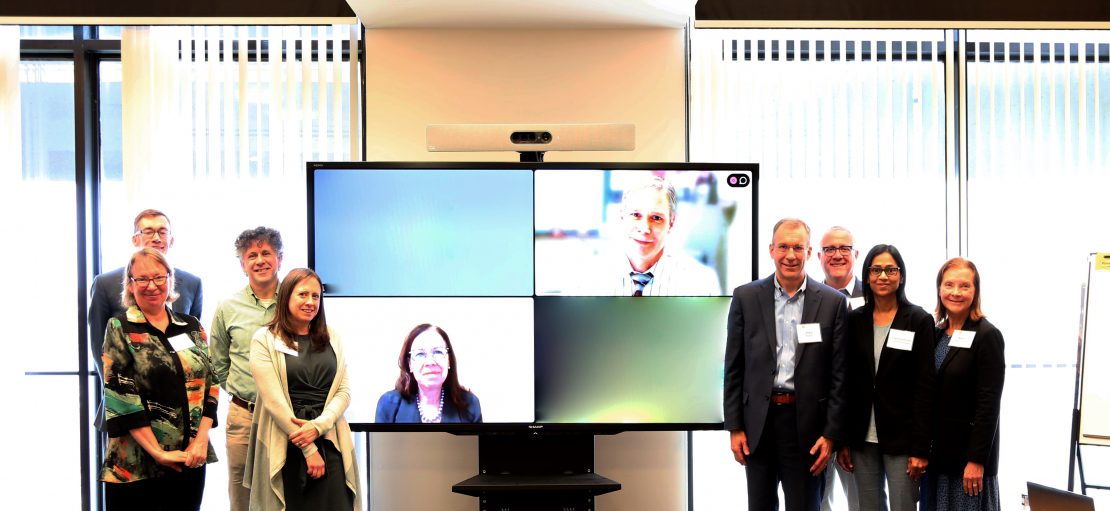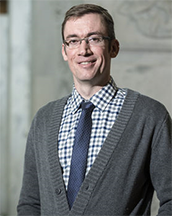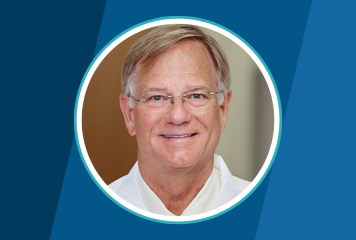The Sleep Medicine Advisory Committee held its spring meeting on Monday, May 1, 2023. The agenda provided an opportunity to update the Advisory Committee on activity at ABIM and allowed for discussion of pressing issues in the field. The Sleep Medicine Advisory Committee was joined by guests from the American Academy of Pediatrics (AAP), the American Academy of Sleep Medicine (AASM), the Assembly on Sleep and Respiratory Neurobiology (SRN) of the American Thoracic Society (ATS), the North American Prodromal Synucleinopathy (NAPS) Consortium for REM Sleep Behavior Disorder (RBD), the Society for Behavioral Sleep Medicine (SBSM) and the Society for Research on Biological Rhythms (SRBR).
The Sleep Medicine Advisory Committee comprises representatives of American Board of Medical Specialties (ABMS) member boards that cosponsor the discipline and public members:
- Robert Stansbury, MD, Advisory Committee Chair; ABIM
- Ruth Benca, MD, American Board of Psychiatry and Neurology (ABPN)
- Sarah McConville, MD, American Board of Anesthesiology (ABA)
- John Poma, MBA, JD (public member)
- Snigdhasmrithi Pusalavidyasagar, MD, ABIM
- Adam Sorscher, MD, American Board of Family Medicine (ABFM)
- Erik St. Louis, MD, ABPN
- Laura Sterni, MD, American Board of Pediatrics (ABP)
- Emerson M. Wickwire, Ph.D. (public member)
- Kathleen Yaremchuk, MD, American Board of Otolaryngology – Head and Neck Surgery (ABOHNS)
The following is a summary of the spring meeting.
Administrative Board Update
Prior to the meeting, members and guests of the Sleep Medicine Advisory Committee received a video update from Richard J. Baron, MD, MACP, President and Chief Executive Officer of ABIM and ABIM Foundation, highlighting progress and inviting discussion from the Advisory Committee on some of ABIM’s leading priorities, including:
- The release of the first Longitudinal Knowledge Assessment (LKA®) quarterly formative score reports to more than 28,000 ABIM diplomates who completed the fifth quarter of their five-year LKA cycle. Diplomates participating in the LKA receive these score reports as a way to let them know how they are performing relative to the passing score and help identify any areas they may want to focus on in their future studies.
- ABIM’s ongoing work in diversity, equity and inclusion (DEI), such as performing differential item functioning analysis of assessment items, developing health equity content in different disciplines, co-funding health equity projects for residencies and creating more inclusive opportunities for diplomates to self-identify on their Physician Portal.
- Developments from the ABIM Board of Directors’ strategic planning work, such as exploring how new technologies like artificial intelligence and machine learning may help ABIM work more efficiently and develop better programs for physicians.
- Continued work with a coalition of national medical organizations to address medical misinformation and promote evidence-based information. Dr. Baron recently coauthored an article in the New England Journal of Medicine and spoke at both the University of California San Francisco Department of Medicine Grand Rounds and South by Southwest on the topic of misinformation.
Members of the Advisory Committee addressed Dr. Baron with questions around some of the topics raised, such as promoting the value of certification to hospitals and health systems in the present climate of staffing challenges. Dr. Baron noted that 72% of physicians are now employed rather than owners of practices and aligned ABIM’s work on misinformation with raising public awareness of the value of a certified credential.
Other questions arose around ABIM’s collaboration with other organizations on issues like misinformation, including organizations within the medical community. Dr. Baron emphasized that ABIM does not engage in legislative lobbying but works with medical societies and the coalition mentioned above to raise awareness about misinformation and create a strategic response.
Dr. Baron also held some further discussion around ABIM’s work in DEI to make sure its assessments are fair—in line with the work of other American Board of Medical Specialties (ABMS) member boards—and that its governance represents the diversity of the diplomate population.
Misinformation and Implications for Sleep Medicine
The Advisory Committee held an open discussion on the implications of misinformation for the discipline of sleep medicine, including its effects on patient care, in order to contribute to ABIM’s ongoing strategic conversations about the issue. In discussion, the group’s comments fell into three themes:
- Misinformation around alternative medicine, such as CBD, THC and other cannabis-based products being used to treat insomnia and the perception that they are natural and therefore less likely to have side effects compared with pharmaceutical medications.
- Misinformation about sleep tracking devices and applications, particularly the accuracy and ability of these technologies to track and improve sleep. Patients seek treatment for what their wearable devices identify as sleep issues, but physicians cannot validate the data because the algorithms are protected and not clinical metrics. Clinical sleep studies are necessary to accurately evaluate sleep issues. However, it was noted that sleep tracking devices have had a positive impact in bringing sleep medicine to the fore and increasing the public’s attention about it.
- Misinformation around the recall of continuous positive airway pressure (CPAP) machines, which has generated confusion for patients and led many patients to discontinue use of CPAP machines without discussion with their sleep medicine provider.
Special Consideration Pathways for International Medical Graduates
ABIM’s standard training requirements for certification include the satisfactory completion of accredited internal medicine residency and subspecialty fellowship training in the United States or Canada. In addition, there are four special consideration pathways to enable osteopathic or internationally trained physicians to obtain ABIM certification. The ABIM Council—which comprises the chairs of the individual specialty boards and advisory committees, as well as public and patient members—is exploring the idea of creating another special consideration pathway for international medical graduates who have completed their internal medicine training in another country and then completed accredited fellowship training in the U.S. or Canada. Like other ABIM diplomates, physicians in the proposed pathway would need to pass the ABIM Internal Medicine Certification Examination, and satisfactorily complete their accredited fellowship training to be eligible for subspecialty certification.
The Advisory Committee held a discussion about the implications of this possible policy change for the field of sleep medicine including concerns around the quality of training programs in other countries, trainees using the pathway to circumvent a three-year Accreditation Council for Graduate Medical Education (ACGME) residency in internal medicine, and trainees leaving the U.S. and the effect of that on the workforce.
Some members of the Advisory Committee commented favorably on the pathway, adding that it might increase diversity in the field and access for people who previously did not have a path to certification.
Sleep Medicine LKA: Obstructive Sleep Apnea Emphasis
The Sleep Medicine LKA: Obstructive Sleep Apnea (OSA) Emphasis is a focused assessment that covers the entire sleep medicine blueprint with a higher percentage of items on OSA and related disorders. There is an overlap of approximately 70% with the current general Sleep Medicine blueprint so that the full blueprint is assessed in both options. The remaining 30% of content includes questions on, among other things, bruxism, snoring, gastrointestinal reflux disease and home sleep apnea testing.
In response to concerns about the Sleep Medicine LKA OSA expressed at the fall 2022 Sleep Medicine Advisory Committee meeting, ABIM staff presented a brief overview of the OSA pathway with background information on overlaps between the OSA and Sleep Medicine blueprints, item development and enrollment data.
Jeremy Dugosh, Ph.D., Vice President of Test Development for ABIM, noted further that the certificates for Sleep Medicine diplomates are the same regardless of which version of the LKA they take, and that all diplomates in sleep medicine are responsible for knowing all the parts of the discipline. The OSA emphasis pathway offers a different proportion of questions on OSA and related disorders, but the blueprint as a whole is designed to touch on all important areas of the discipline.
It was also noted that all Sleep Medicine diplomates passed the same version of the initial certification exam and the OSA version of the LKA still covers what diplomates need to know to keep their knowledge up to date.
Several members of the Advisory Committee expressed support of the OSA emphasis pathway. Representatives from AASM cautioned that the OSA emphasis pathway might unintentionally “splinter” the discipline and suggested monitoring its impact. Staff pointed out that the OSA is a pilot subject to review and formal approval by ABMS and noted that its potential to cause splintering in the discipline would be seriously considered.
Advisory Committee Oversight of Assessments
The advisory committees and specialty boards that oversee each discipline of internal medicine are responsible for reviewing and approving the assessment blueprints and standards for certification, Maintenance of Certification (MOC) and the LKA. Each spring, the advisory committees and specialty boards review data related to the population of new graduates entering the discipline, diplomates maintaining their certification, workforce information, and assessment performance trends and feedback. Periodic review of these data helps to inform the advisory committees’ assessment decisions. The Sleep Medicine Advisory Committee discussed assessment data in the discipline and provided feedback to ABIM staff about which data were most helpful for ongoing oversight of assessment. Some of the data the Advisory Committee reviewed are publicly available on ABIM’s website, including:
- Relative distribution of fellows in training per discipline
- Percentage of first-year fellows who are female by subspecialty
- Initial certification pass rates by discipline
- MOC pass rates by discipline
- Number of candidates certified in each discipline each year
Sleep Medicine is currently the only discipline of internal medicine with the number of applicants per position (increasing) and the percent of applicants matched (decreasing) trending in an opposite direction. This suggests an increased interest in sleep medicine among fellowship applicants.
There was some discussion around the Sleep Medicine Advancing Innovation in Residency Education (AIRE) program. Michelle Zeidler, MD, Chair of the Sleep Medicine Program Director Committee of the SRN, expressed the importance of the AIRE program in increasing the number of trainees entering sleep medicine. Sally Podolski, Graduate Medical Education Specialist for AASM, noted that 2023-2024 is the last year for the program but given the level of interest, AASM will work with specialty boards to transition the AIRE pilot to an approved certification pathway for programs.
The Advisory Committee and guests also heard some information about the LKA. To date, 88% of eligible Sleep Medicine diplomates of ABIM and the cosponsoring boards combined (those due for an assessment in 2023) have chosen the LKA pathway. Staff also confirmed that data gathered over the first year of the LKA’s availability indicate that most questions on the LKA are answered in under two minutes.
Some members of the Advisory Committee asked additional questions, such as whether the LKA is improving patient outcomes. ABIM is tracking patient outcomes as a measure of the value of certification and coauthored a publication on the subject. It was also asked how the timing of when participants answer questions impacts their performance—for instance, some LKA participants answer all questions in one sitting at the end of the quarter. ABIM is looking into whether this impacts performance.
The Sleep Medicine Certification Examination is now offered on an annual basis as of 2023. Read more about this news on the ABIM Blog.
Setting a Quality Agenda in Sleep Medicine
In late 2021, the ABMS—which comprises 24 medical certifying boards in the U.S., including ABIM—published new standards for continuing certification. The standards include a requirement for member boards like ABIM to facilitate the development of a discipline-specific quality agenda. Richard G. Battaglia, MD, FACP, Chief Medical Officer at ABIM, spoke to the Sleep Medicine Advisory Committee about the new standard. He emphasized that this standard is not resulting in an individual diplomate requirement to complete quality improvement activities for ABIM MOC and that requirements for other ABMS member boards vary. Dr. Battaglia invited the group to discuss how they envision ABIM engaging external stakeholders to identify issues that can serve as elements of a mutually agreed quality agenda in the discipline and the role the Advisory Committee can play in this process.
Dr. Sterni and Dr. McConville, representing ABP and ABA respectively, shared some of their experience with individual requirements of their home boards, such as a library of quality agenda resources for physicians and points requirements for quality improvement. The Advisory Committee agreed to meet again to discuss the quality agenda initiative in greater depth.
Communications and Governance Engagement
John Held, Senior Director of Communications, and Peter McConnell, Program Manager for Governance and Medical Society Communications, updated the Advisory Committee on ABIM’s ongoing communications work with Governance (the ABIM Board of Directors, ABIM Council, Specialty Boards and Advisory Committees, and Approval Committees) and invited members to participate in engagement work. The communications team regularly engages ABIM Governance members to help give diplomates a better understanding of the individuals representing their interests in each discipline, and to help the community better understand the value of certification.
Advisory Committee members provided feedback about how they could continue to take an active role in ABIM’s communications initiatives with diplomates, the medical community and the public, such as through media interactions, the ABIM blog and working with their colleagues and medical societies.
Selection of New Approval Committee Members
The Advisory Committee reviewed the physician candidates for open positions on the Sleep Medicine Approval Committees. As standard procedure, applicants for open positions on the Sleep Medicine Approval Committees are interviewed and then recommended by the Approval Committees themselves; the Advisory Committee then reviews recommended candidates and makes the final selection for open positions.
Members reviewed the composition of cosponsoring board members on the committees, including discussion around ensuring that each committee adequately represents the various cosponsoring boards. After discussion, the Advisory Committee voted unanimously to approve Nancy Stewart, DO, MS, of the University of Kansas Medical Center to a term beginning July 1, 2023, on the LKA Approval Committee.
There are still open positions on the Item-Writing Task Force. Openings in Sleep Medicine, as well as all other specialties, can be found online.
Update from the Sleep Medicine Approval Committees
Sabra M. Abbott, Ph.D., MD, Northwestern University Feinberg School of Medicine; Chair of the Sleep Medicine LKA Approval Committee
Dennis H. Auckley, MD, Case Western Reserve University; Chair of the Sleep Medicine Traditional, 10-Year Maintenance of Certification (MOC) Exam Approval Committee
There are two ABIM Approval Committees working with the Sleep Medicine Advisory Committee: the Traditional, 10-year MOC Exam Approval Committee (which also deals with the initial certification exam), and the LKA Approval Committee. Approval Committees are responsible for approving all assessment content and maintaining the assessment blueprints in their discipline. Drs. Abbott and Auckley provided a brief update on the Item-Writing Task Force, the meetings of each of the Approval Committees, the items reviewed at those meetings and current state of live and pre-test questions on each assessment.
In Closing
The Sleep Medicine Advisory Committee values the feedback and commentary of the entire medical community, including diplomates and society partners.
Do you have any questions? Are you interested in getting involved?
If you are certified by ABIM and have questions after reading this report, please connect with us through the following channels:
- Subscribe to the ABIM blog.
- Call 1-800-441-ABIM (2246).
- Email request@abim.org.
- Join our Governance to help guide our future direction.
- Join our Community Insights Network (available to ABIM diplomates only) to share your feedback.




